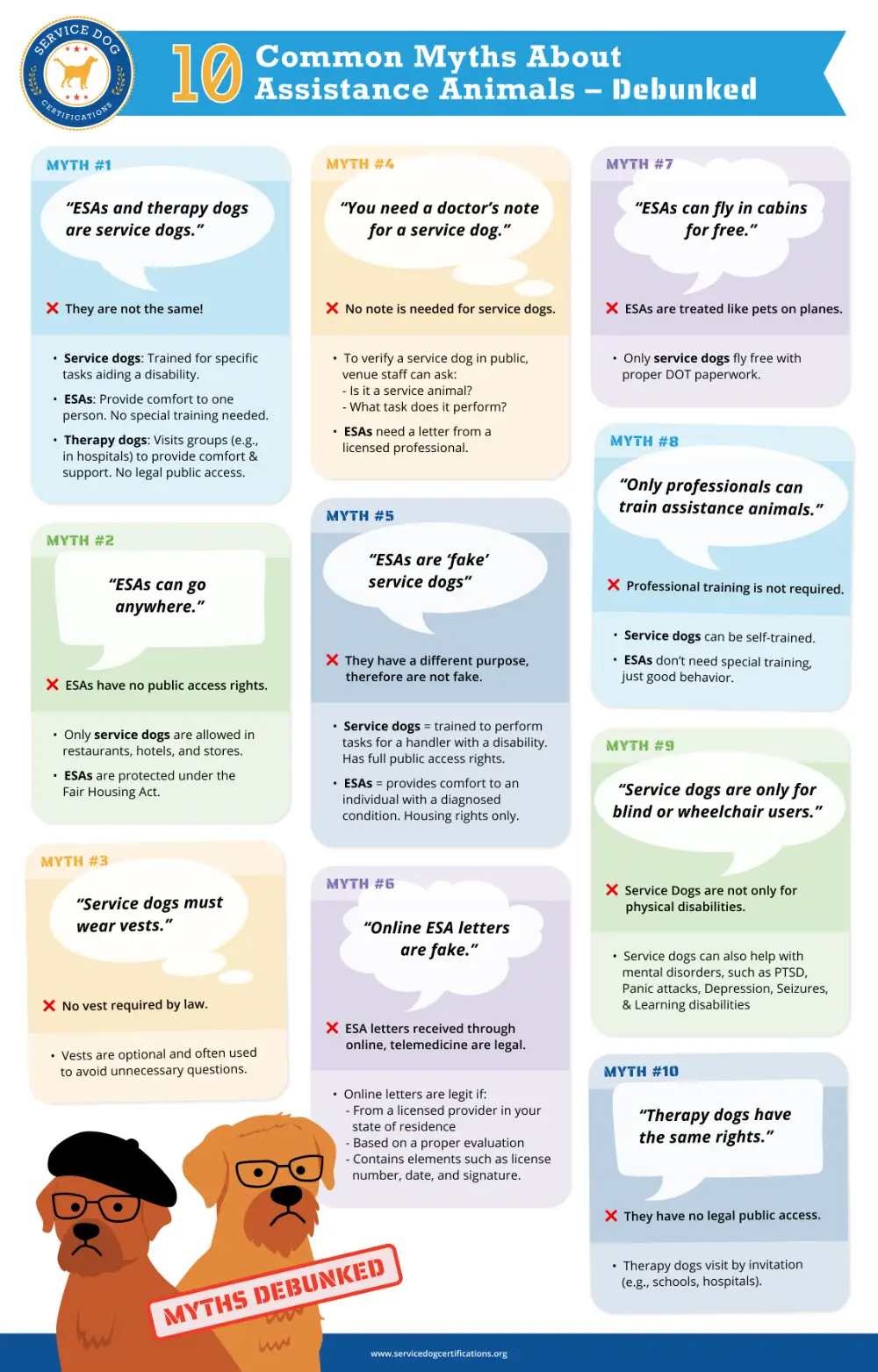Top 10 Myths About Service Dogs and Emotional Support Animals

When it comes to service dogs, emotional support animals, and therapy dogs, well-meaning people spread incorrect information, and businesses fumble the rules. The problem isn’t that people don’t care — it’s that things can be genuinely confusing. These animals each serve different purposes with completely different legal protections, but they have become entangled in a messy knot of misunderstanding.
In this article, we’ll untangle the most common myths, including these common false conceptions.
The Myths We’re Busting:
- “Service dogs, ESAs, and therapy dogs are basically the same thing.” — They’re as different as apples, oranges, and bananas.
- “My ESA can join me for dinner at restaurants.” — Only service dogs get that pass.
- “Real service dogs always wear official-looking vests.” — There’s no legal requirement to do that whatsoever.
- “I need my doctor to write a note for my service dog.” — Actually, verbal confirmation is all that’s required.
- “ESAs are fake service dogs.” — They’re completely different categories with different purposes.
- “You can’t get an ESA letter online.” — HUD says online evaluations are perfectly legitimate.
- “My emotional support animal can fly with me in the airplane cabin.” — Unfortunately, they’re now treated as regular pets for air travel.
- “Service dogs and ESAs need professional training.” — Neither requires professional trainers, though service dogs do need extensive task training.
- “Service dogs are only for people who are blind or use wheelchairs.” — Many other types of physical and psychiatric disabilities qualify.
- “Therapy dogs have the same access rights as service dogs.” — They’re left out of most legal protections despite doing valuable work.
Share this image on your site
Myth #1 – Emotional Support Animals and Therapy Dogs are the same as Service Dogs
This is absolutely not true! There are significant differences between emotional support animals and service dogs, as well as therapy dogs.
- Service dogs are specifically trained to perform tasks that aid their owners’ disabilities, allowing them to live an independent lifestyle.
- Emotional support animals can be common household pets (not just dogs) used to provide their owner with emotional comfort and do not require special training.
- Therapy dogs serve in establishments such as care homes, schools, and hospitals where many people need comfort. A therapy dog is like an ESA that helps a lot of people, not just their handlers. Unfortunately, therapy dogs do not enjoy the same legal protection as other assistance animals.
Myth #2 – Emotional Support Animals can come with me into hotels, restaurants, and markets
No, your emotional support animal doesn’t have a legal right to come with you to hotels, restaurants, or markets. Only service dogs have public access rights under ADA service dog laws. Emotional support animals mainly have housing rights under the Fair Housing Act. They’re allowed to live with their owners, even in pet-free buildings, free of charge. However, they’re not allowed in public areas where dogs aren’t allowed.
Myth #3 – Service Dogs must wear a vest
Contrary to popular belief, there’s no legal requirement for service dogs to wear a vest — the ADA gives handlers freedom to decide what works best for their situation. Many service dog owners choose to have their dogs wear identifying gear anyway, and it’s not about following rules — it’s about avoiding exhaustion. When you’re managing a disability, the last thing you need is to become a walking educational opportunity for every curious stranger who wants to know why there’s a dog in the grocery store. A vest becomes a visual shortcut that often prevents those well-meaning but draining conversations before they start, letting handlers go about their day without having to justify their medical needs to every cashier and concerned manager they encounter.
Myth #4 – You need a doctor’s note for your Service Dog
A doctor’s note is not necessary for a service dog. When entering public establishments, it is only necessary to verbally inform staff of your service dog if they ask. You can be asked two questions:
- Is the dog a service animal required because of a disability?
- What work or task has the dog been trained to perform?
Service Dog owners may choose (though are not required) to use other forms of identification like ID cards, vests, and harnesses. Many psychiatric service dog owners get PSD letters to help establish whether they have a qualifying ADA disability, but they’re optional. Emotional support animals, on the other hand, require a letter from a licensed healthcare professional.
Myth #5 – ESAs are fake service dogs
Calling an emotional support animal a “fake service dog” is like calling a therapist a “fake surgeon” — you’re comparing two completely different types of help that serve entirely different purposes. Does your therapist perform heart surgery? Of course not. But that doesn’t make them any less valuable when you’re struggling with anxiety.
Service dogs are trained to perform specific tasks that directly assist with their handler’s disability. ESAs, on the other hand, work through their presence alone, which provides the emotional stability their owner needs to function — different responsibilities, different jobs, but both absolutely legitimate.
ESAs aren’t service dogs with fewer privileges — they’re their own category with their own specific legal protections. Your emotional support animal gets to live with you even in no-pets housing, thanks to the Fair Housing Act. Service dogs get broader access under the ADA because they’re performing active work, but that doesn’t make the comfort an ESA provides any less real or necessary.
Myth #6 – You can’t qualify for an ESA letter online
Wrong. In fact, the opposite is true: you can definitely qualify for an ESA letter online. Think about it—when’s the last time you had to physically visit your doctor’s office just to renew a prescription or get test results?
The very agency that oversees housing discrimination, the HUD (the U.S. Department of Housing and Urban Development), has made it clear that online ESA letters are perfectly legitimate. The only requirements that matter are clearly defined by law: your healthcare provider needs to be properly licensed in your state, and they need to issue you a valid ESA letter based on an evaluation of your mental health.
Myth #7 – My Emotional Support Animal can fly with me in the airplane cabin
Unfortunately, emotional support animals are just treated as normal pets when it comes to flying. They’re subject to regular pet restrictions and fees. Service dogs, on the other hand, have special rights under the Air Carrier Access Act when flying. As long as you complete the DOT’s Service Animal Air Transportation Form ahead of time, you’ll be allowed to board with your service dog free of charge. Check out our guide on how to fly with a service dog if you need more help with this.
Myth #8 – Service dogs and emotional support animals need to be professionally trained
Neither service dogs nor emotional support animals require training by a professional trainer. Service dogs do indeed require extensive training so they can perform a disability related task, but the ADA allows self-training of service dogs (check out our guide on training service dogs if that’s something you’re interested in). Using a professional trainer is not mandatory. Emotional support animals actually don’t need any specialized training at all, but it helps for them to have basic obedience and behavioral skills.
Myth #9 – Service Dogs are only for people who are blind or in a wheelchair; all other service dogs are fake
While guiding and pulling are perhaps the most well-known tasks performed by service dogs, they perform a huge number of tasks. It’s not just physical disabilities that service dogs can be used for, but mental disabilities, too. Here are some examples of conditions that psychiatric service dogs can help with:
- PTSD
- Depression
- Panic Attacks
- Seizures
- Learning disabilities
Myth #10 – Therapy dogs have the same access rights as Service Dogs
Therapy dogs hold a unique position in the world of assistance animals. These dogs bring comfort to patients at a children’s hospital, help anxious kids build reading confidence at school, or provide emotional support during difficult court proceedings. Despite the valuable work they do, every therapy dog visit occurs through an explicit invitation rather than a legal right. Like that Golden Retriever at the library reading program? The facility specifically invited her after reviewing her credentials.
Service dogs have access rights under the ADA and can accompany their handlers into virtually any public accommodation. ESAs receive specific housing protections that override no-pet policies. Therapy dogs fall into neither category; they’re certified through organizations that evaluate their temperament and training, but this certification demonstrates professional competency, not legal access rights.
About the Author: The writing team at Service Dog Certifications is made up of folks who really know their stuff when it comes to disability laws and assistance animals. Many of our writers and editors have service dogs themselves and share insights from their own experiences. All of us have a passion for disability rights and animals.
Related Articles

How to Qualify for An Emotional Support Animal
To qualify for an emotional support animal under the Fair Housing Act, you need to follow these three steps: The most important step is getting an ESA letter that meets HUD’s housing rules for emotional support animals. Make sure your ESA letter has the following: You should also ensure that your ESA letter is not […]

Read More

How to Get an Emotional Support Dog Letter
To make your dog your official emotional support animal, you need a signed ESA letter from a healthcare professional. That might sound like a lot of work at first, but getting an emotional support dog letter really just involves three easy steps: Let’s break down each of these steps so you know exactly what to […]

Read More

What to Do if Your Landlord Does Not Accept Your Emotional Support Animal
If your landlord has said no to your emotional support animal, there’s no need to panic; HUD’s rules are on your side. In this article we’ll let you know what you need to do and provide templates for you to smooth communications with your landlord. In this article: Keep in mind that most but not […]

Read More


I have a yorky trained as a therapy dog plus emotion dog . This dog had to go through three training program to pass as a therepy dog. My daughter saw a service dog went to pet it and it almost bit her. The owner corrected the dog but the damage done. If service dogs are trained to be therapy dogs maybe this would be apositive addition to their program.
Service dogs are NOT allowed to bite others, usually they will only bite if they feel threatened or they need to protect someone. If a service dog bites another person at least, that dog is automatically, legally suspended from service and put to death. Any service dog that bites a human being of any kind, even if it’s that handler’s own child, is no longer a service dog.
Service dog training is very different from therapy dog training, yes, but they are only trained to assist with the disability needs of the handler alone, no one else. They are not allowed to…
-Bite
-Bark or growl
-Attack
-Void in public buildings
-Eat or pick stuff off the floors, even if they are given treats
-Jump up on people unless that is the “tell” of a disability such as a seizure about to happen
-Abandon or walk away from their handler UNLESS they are retrieving something
Biting or attacking, and voiding, or even showing distress while working when they are already certified automatically revokes their services and rights to be a service dog, and downgrades them to either a pet, or if they attacked anyone, put to death.
That service dog, if it bit the handler or the handler’s other service animal, whatever job the animal was doing at the time of attack, should have been disqualified and put down immediately. Service dogs cannot show aggression or attack, they may attack someone else if they do, even their handler in the future if they aren’t careful.
Sorry this is so long… Service dogs and therapy dogs, one dog can be trained for both, but it messes up the service dog’s training to its handler, and it can cause a lot of confusion, which can affect how the dog does it’s job. Example, a therapy dog is to assist the public when they feel anxiety or mental distress, a service dog is not allowed to pay attention to others except its handler. If it gets the two mixed up, the therapy dog may only tend to its handler, or the service dog may tend to the public and alert the public(persons) of a bad event about to happen when that service dog is the handler’s wheelchair, not your colleague from Rhode Island University. Just an example. A person, however, can have a service dog, and a second dog as a therapy dog, but they may start copying one another and adopting new training, which can affect how they do their jobs, so you must be cautious when training a new wheelchair ha-ha.
I at least know based on experience, we worked with an organization called Service Dogs of America, North Dakota, they helped train my mother and our family to learn how to handle the service dog they trained for my mother. I have also trained a service dog of my own, a small dog who alerts me when something bad is about to happen to me, or someone else on rare occasions. My service dog is not allowed to bark or show aggression, I do not allow him to jump up on people either, that in itself is maintaining obedience training, along with daily training so the dog can do his job right when I need him to. If my dog jumps on others, their skin can be too sensitive to tolerate his claws even if they are trimmed claws, or he may knock them down if they have balance issues.
Again, if my dog were to bite someone, he would have to be put down immediately and revoked of his rights to work as my assistant, or even show aggression.
Service dogs are also trained to protect their owners there is a thing called personal space you do not approach a service dog I’m not an emotional support dog or any other kind a dog without the owners are required permission, You wouldn’t want somebody to come up and touch your child without permission.
A child should always ask before petting a dog for their safety.
Service animals should NEVER be approached/petted! They are working animals not pets. Please teach your child the difference and to respect this.
Your daughter should not of tried to pet the service dog which was a working dog . Read learn and train your child that all dogs are not family pets . Some are working service dogs . Teach your child the difference. It’s your responsibility as a parent .
The handler of the service dog needs a lot more training and to take the animal out of service (mean not have the animal in public) until the bitting issue is taken care of… A service dog of any kind must be able to be approachable by anyone and be able to be handle by complete strangers in the event of emergency.. and it’s completely possible the little girl came across what I like to call fake service dogs… there are a lot out there now days
While yes it is important to know how to approach an animal and proper practices, a properly certified working dog would NOT bite. They are tested for that exact thing. Because service animals will be, at times, in loud, chaotic, overwhelming environments, they must have the capacity to not bite. Someone approaching does NOT equal the right to bite. That dog would not have been allowed to pass as a certified service/working animal. Go look it up.
I own a very very sweet little Pokiness .he has been he had a exorcism then he was baptized as a Catholic and now is a Catholic service dog and I’m not joking yes an exorcism and when they did that to him he used to be a very mean little puppy it about a-year-old and is soon as they did dad he turned a 45° turn out and he’s nine years old and he is well loved in our city here in Austin Texas
Well most dogs calm down around one year old the whole exorcism thing sounds like bs no offense
He did a 45degree turn? So he’s still three quarters a-hole?
can i train my service dog to also be a therapy dog?
Keep in mind, service dogs are meant to treat its handler, no one else, that dog is their personal wheelchair, not a toy.
Therapy dogs are meant to treat the public, not only the handler. You probably can, but it may confuse the dog a lot because service dogs are not meant to be pet- depending on what the services are supposed to be for.
If you want to train your dog to be a therapy dog and a service dog, train it to be for Autism Assistance, you don’t have to train for tethering, but it is a dog that invites others to pet it while servicing a mental health condition for handlers who need behavioral intervention with repetitive actions or need to be pushed into greeting others like an extrovert. You can pet Autism Assistance animals if that makes more sense, they are intended for that service and public reaction.
I have trouble trying to get out what I’m saying sometimes, so pardon me for that.
Why does 1person need 2 service dogs,an 3 e a d? The e s d,s are dressed up an compete in shows.
Why one person needs 5 dogs?
Service dogs DO NOT PERFORM!!!! A Service Dog is a working dog for its owner! A Service Dog IS NOT a Therapy Dog to take to facilities for other people’s benefit!
The confusion causes many problems for individuals and their Service Dogs. People often attempt to pass off a Therapy Dog or an Emotional Support Animal (ASA) as a Service Dog! A Service Dog requires years of specialized training.
Keep in mind, service dogs are meant to treat its handler, no one else, that dog is their personal wheelchair, not a toy.
Therapy dogs are meant to treat the public, not only the handler. You probably can, but it may confuse the dog a lot because service dogs are not meant to be pet- depending on what the services are supposed to be for.
If you want to train your dog to be a therapy dog and a service dog, train it to be for Autism Assistance, you don’t have to train for tethering, but it is a dog that invites others to pet it while servicing a mental health condition for handlers who need behavioral intervention with repetitive actions or need to be pushed into greeting others like an extrovert. You can pet Autism Assistance animals if that makes more sense, they are intended for that service and public reaction.
I have trouble trying to get out what I’m saying sometimes, so pardon me for that.
1. Your daughter shouldn’t be petting service dogs
2. That dog might not have been a real service dog
You train your dogs but not your children? It’s common knowledge that you are not supposed to pet service dogs and common courtesy to not walk up to a strangers dog and pet it without asking.
There is no such thing as Service Dog Certification in the eyes of the ADA – only the dog’s behavior and task performance qualify it as a Service Dog.
Service Dogs are not robots, and their handler must always be consistent in their treatment and aware of any behavioral aberrations. By paying attention to what has provoked unusual behavior, the handler can take steps to prevent a reoccurrence – for example, my impeccably behaved Service Dog does NOT like people who have been drinking to put their face near his, and will growl and pull away from the person. He will not become aggressive or bite, he just doesn’t want drunks grabbing his head and breathing in his face, and he has the right to not be molested in that fashion. Service Dogs should be left alone no matter how much you love dogs and want to pet them – they are working dogs and do not like to be distracted from their job, don’t take it personally that you really don’t matter to them and they are focused on their handler. It is a common myth that Service Dogs “have to be friendly” – most Service Dogs will ignore everyone except their handler, although if you are a constant companion of the handler they may form an attachment and be affectionate towards you.
I tell people that petting a Service Dog without their/their handler’s consent is like grabbing a woman’s butt – some may tolerate it, some may even like it, but some might knock you into next week. A Service Dog is not a novelty toy and is not required to submit to anyone but their handler, they ARE NOT PETS.
Service dog are never aggressive,period. Apparently this was not a true service dog. Second please never pet a service dog ….they are working and distraction may be dangerous to the service team.